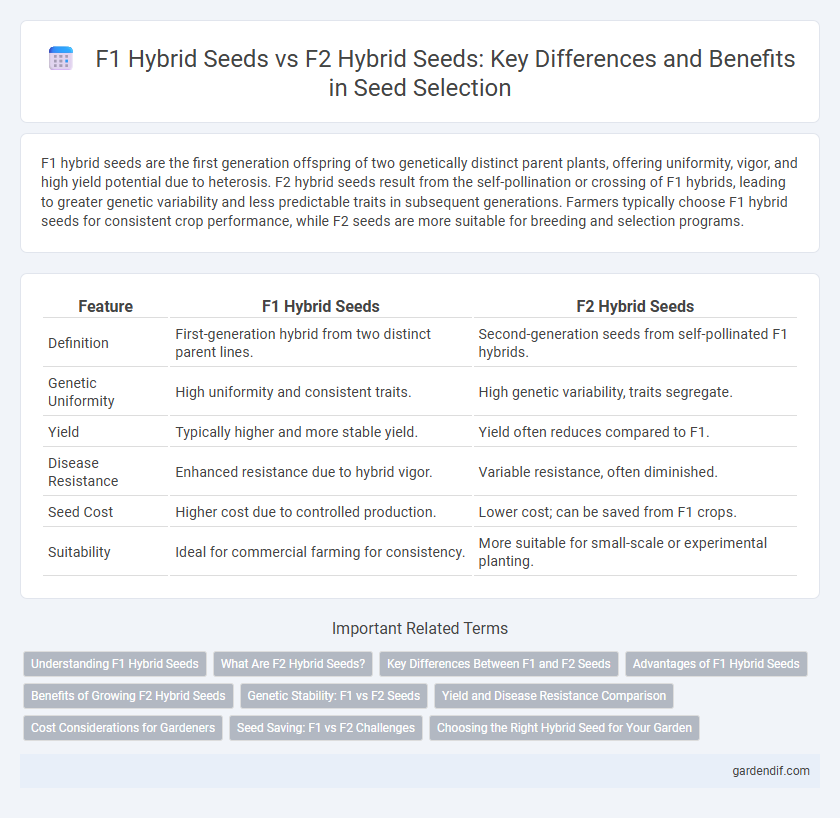
F1 hybrid seeds vs F2 hybrid seeds Illustration
F1 hybrid seeds are the first generation offspring of two genetically distinct parent plants, offering uniformity, vigor, and high yield potential due to heterosis. F2 hybrid seeds result from the self-pollination or crossing of F1 hybrids, leading to greater genetic variability and less predictable traits in subsequent generations. Farmers typically choose F1 hybrid seeds for consistent crop performance, while F2 seeds are more suitable for breeding and selection programs.
Table of Comparison
| Feature | F1 Hybrid Seeds | F2 Hybrid Seeds |
|---|---|---|
| Definition | First-generation hybrid from two distinct parent lines. | Second-generation seeds from self-pollinated F1 hybrids. |
| Genetic Uniformity | High uniformity and consistent traits. | High genetic variability, traits segregate. |
| Yield | Typically higher and more stable yield. | Yield often reduces compared to F1. |
| Disease Resistance | Enhanced resistance due to hybrid vigor. | Variable resistance, often diminished. |
| Seed Cost | Higher cost due to controlled production. | Lower cost; can be saved from F1 crops. |
| Suitability | Ideal for commercial farming for consistency. | More suitable for small-scale or experimental planting. |
Understanding F1 Hybrid Seeds
F1 hybrid seeds result from the cross-pollination of two genetically distinct parent lines, creating offspring with uniform traits such as enhanced vigor, disease resistance, and higher yield potential. These seeds deliver consistent crop performance due to their stable genetic makeup, making them ideal for commercial agriculture. Unlike F2 seeds, which exhibit genetic segregation and variability, F1 hybrids provide predictable growth characteristics essential for optimizing farming efficiency.
What Are F2 Hybrid Seeds?
F2 hybrid seeds are the second generation resulting from the self-pollination or crossing of F1 hybrid plants, displaying greater genetic variation and a broader range of traits compared to the uniform F1 seeds. These seeds often show less predictability in characteristics such as yield, disease resistance, and plant vigor, as the dominant traits from the F1 generation segregate into various genotypes. Farmers and gardeners use F2 hybrid seeds primarily for experimentation or breeding purposes rather than for consistent crop production due to their variable performance.
Key Differences Between F1 and F2 Seeds
F1 hybrid seeds result from the controlled cross-pollination of two genetically distinct parent plants, producing uniform offspring with enhanced vigor, disease resistance, and higher yields. F2 hybrid seeds, obtained by self-pollinating or interbreeding F1 plants, exhibit genetic segregation leading to greater variability, reduced uniformity, and inconsistent trait expression. Farmers and gardeners prefer F1 seeds for predictable performance, while F2 seeds are often used for breeding and selection purposes.
Advantages of F1 Hybrid Seeds
F1 hybrid seeds offer uniformity in plant traits, resulting in consistent crop quality and higher yields compared to F2 hybrid seeds, which exhibit greater genetic variability. These seeds demonstrate enhanced vigor and disease resistance due to hybrid vigor (heterosis), improving overall crop performance. Farmers benefit from predictable growth patterns and superior stress tolerance when using F1 hybrids, making them a preferred choice for commercial agriculture.
Benefits of Growing F2 Hybrid Seeds
F2 hybrid seeds offer greater genetic diversity compared to F1 hybrids, which can lead to increased resilience against pests and diseases in crops. Growing F2 seeds reduces the need to purchase new seeds annually, providing cost savings for farmers through seed saving and replanting. This genetic variability also allows growers to select and breed plants with desirable traits over successive generations, enhancing adaptability in local growing conditions.
Genetic Stability: F1 vs F2 Seeds
F1 hybrid seeds exhibit high genetic stability, producing uniform plants with consistent traits due to controlled crossbreeding of two distinct parent lines, ensuring predictable performance. F2 seeds, derived from self-pollination of F1 plants, show greater genetic variability and segregation, leading to diverse phenotypes and reduced uniformity. This genetic instability in F2 seeds often results in unpredictable crop quality and yield compared to the reliable traits of F1 hybrids.
Yield and Disease Resistance Comparison
F1 hybrid seeds consistently deliver higher yields due to their hybrid vigor, producing uniform and robust plants that outperform F2 hybrids in agricultural productivity. Disease resistance in F1 hybrids is typically stronger and more reliable because of controlled breeding, while F2 hybrids show greater genetic variability, often resulting in diminished resistance and inconsistent crop quality. Farmers prioritize F1 seeds for maximizing yield and minimizing losses from pests and diseases, making them the preferred choice in commercial farming.
Cost Considerations for Gardeners
F1 hybrid seeds generally cost more than F2 hybrid seeds due to the complex breeding processes involved in ensuring uniformity and desired traits in F1 plants. Gardeners opting for F1 seeds may benefit from higher vigor and consistent yields, justifying the higher initial investment. In contrast, F2 seeds, being seeds saved from F1 hybrids, are cheaper but can produce plants with variable characteristics, potentially impacting overall garden productivity and quality.
Seed Saving: F1 vs F2 Challenges
F1 hybrid seeds offer uniformity and higher vigor but saved seeds typically lose these traits in the F2 generation due to genetic segregation, leading to unpredictable plant characteristics. F2 hybrid seeds show greater genetic variability, resulting in inconsistent crop quality and yield, which complicates saving viable seeds for future planting. Seed savers often prefer F1 hybrids for immediate performance but face significant challenges maintaining desired traits across generations without professional seed breeding techniques.
Choosing the Right Hybrid Seed for Your Garden
F1 hybrid seeds offer uniformity, vigor, and disease resistance, making them ideal for gardeners seeking consistent, high-yield crops. F2 hybrid seeds, derived from self-pollinating F1 plants, display greater genetic variation, resulting in diverse plant traits but less predictability. Selecting F1 seeds ensures reliable performance, while F2 seeds suit gardeners interested in experimentation and seed saving.
F1 hybrid seeds vs F2 hybrid seeds Infographic

 gardendif.com
gardendif.com